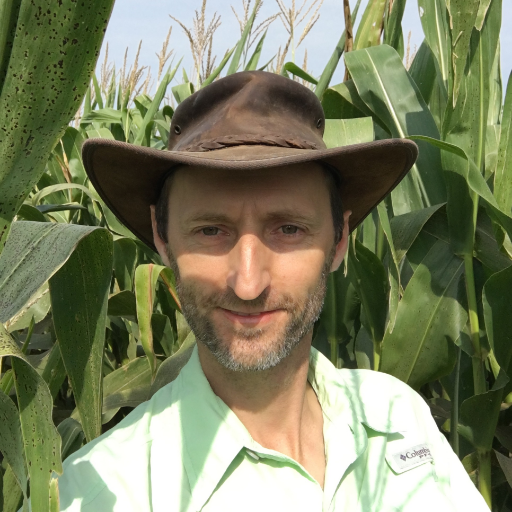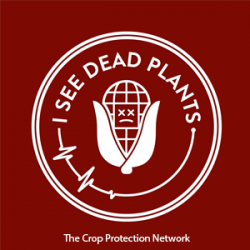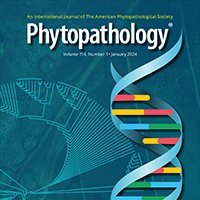
Martin Chilvers
@MartinChilvers1
Followers
2K
Following
6K
Media
281
Statuses
3K
Field crop pathologist at Michigan State University, with interests in fungal and oomycete biology and genetics YouTube @ MSU Field Crops Pathology
East Lansing, MI
Joined October 2012
"Results emphasize that fungicide applications occurring at VT/R1 and when disease severity exceeds 5%, are more likely to result in positive economic gain." Read more in the new @phytofrontiers article at https://t.co/JRiORbl56C. From @NabinKDangal @badgercropdoc
1
13
22
New episode this week! Listen here: https://t.co/mbE4tle0GE I interviewed Dr. Deb Samac of @USDA_ARS. We discussed Deb's work with alfalfa and the disease bacterial stem blight. @ncipmc @CropNetwork @NAFANews
0
3
6
Fusarium stalk rot causes shredded pith that may be tan to light pink. Brown streaks may be observed on the lower internodes. The fungi overwinter in corn residue, other dead plant residue, and in corn seed. Resistance to Fusarium stalk rot is available. Rotation and tillage
1
21
36
Wheat streak mosaic, High plains disease, and Triticum mosaic are part of a virus disease complex found in most wheat growing regions of the U.S. and into Canada. This disease complex can cause major losses in spring and winter wheat. Some virus-resistant wheat varieties exist.
0
12
19
Pre-ordering fungicides for 2026? Choose the best products for diseases most likely to be an issue in your fields with research-based ratings: Corn Foliar Diseases: https://t.co/6lQaatc5RM Soybean Foliar Diseases: https://t.co/MctBf4oR8d Soybean Seedling Diseases:
0
17
37
Why was southern rust such a big issue in 2025? Why was the risk of tar spot low? Listen to the newest @PenneyPodcast episode at https://t.co/hnN14D1DMk. Featuring @alisonrISU, @dsmuelle, @seanblomgren, & @CyPathology. Name drops include @AOV_OlmedoVelar, @MahDuffeck,
apenneyforyourthoughts.podbean.com
Welcome to A Penney For Your Thoughts, a podcast brought to you by Sean Blomgren and Andrew Penney, live from central Iowa. A show where we discuss all things agronomy, and high yield management,...
0
11
19
Harvested about half of the trials, and our soybean payload is now in transit. Next stop: Agronomy farm MSU, where the data will spill the beans! These loads hold serious potential to answer key research questions. High value, high stakes, legume edition! @MartinChilvers1
#Harvest2025 (almost)! Our soybean research plots are all set, and the combine’s ready to roll. But the pods are still a bit moist and not shelling cleanly yet, they need to soak up little more sun to make them nice and brittle. Looks like it’s going to be a happening day!
0
1
5
#Harvest2025 (almost)! Our soybean research plots are all set, and the combine’s ready to roll. But the pods are still a bit moist and not shelling cleanly yet, they need to soak up little more sun to make them nice and brittle. Looks like it’s going to be a happening day!
0
1
7
Anthracnose is likely the most prevalent stalk rot in the eastern United States. Affected plants have shredded pith and die prematurely. Anthracnose also causes a distinctive blackening of the stalk rind. Initially, these areas are narrow, water-soaked lesions, but they turn
1
13
32
Issues with corn crown rot this year? Watch the CPN TV episode at https://t.co/O9IDErPu6h. From @UNLExtension's @tjcksn & @ISUExtension's @alisonrISU. @UNL_CropWatch @NeCGA @UNLPlantClinic @ISUANR @iowa_corn #harvest25 #corn
0
7
9
Even though tar spot was a bit delayed in developing in our plots this year. It looks like we will have some high severity numbers for our last rating. @badgercropdoc @AlbertTenuta @alisonrISU @MartinChilvers1
0
2
6
Ear rot & mycotoxin issues during #harvest25? Set the combine to harvest clean, whole kernels, as aflatoxins & fumonisins are often concentrated in light, damaged kernels. To minimize kernel damage, use the lowest possible cylinder speed necessary to shell grain effectively
0
15
24
Ugly ears. Some may contain mycotoxins. Test grain and whole-plant silage for mycotoxins if 10% or more ears have rot. Obtaining a good sample for testing is critical for accurate results. Read more at https://t.co/uLeklcA3Jk.
@badgercropdoc @baldpathologist @MartinChilvers1
0
14
27
Corn leaves are turning brown or are already through the chaff spreader. But here's a poster you can print to keep your eyes tuned for corn disease ID next year. Download at https://t.co/hij9oaY7qO.
#corn #agtwitter
2
30
89
There are five major mycotoxins associated with ear rots. Toxic effects vary by type, concentration, exposure, and animal species. If a field has kernel or ear rot problems (10%+ of ears are moldy), test for mycotoxins. For more info, see Corn Mycotoxin FAQs at
2
18
43
Phyllachora maydis is an emerging disease in the United States and Canada. @CheckJill et al. described the environmental drivers of spore release and dispersal to fill current knowledge gaps in the tar spot disease cycle. 🌽 @MartinChilvers1 Learn more:
apsjournals.apsnet.org
Phyllachora maydis, the causal agent of tar spot of corn, is an emerging disease in the United States and Canada. This study aimed to improve our understanding of P. maydis spore release and disper...
0
3
7
Hay you! Check out the new #alfalfa foliar disease diagnostic poster at https://t.co/f0x6dm4CGI.
2
10
31
Planting resistant varieties is the most effective way to manage anthracnose in alfalfa. Read more in the Overview of Alfalfa Anthracnose at https://t.co/Hs3GUmIyLN. From @DTelenko @BisonBeanDoc @badgercropdoc @cropdoc08 @KelseyFAndersen @MartinChilvers1 @MahDuffeck
0
7
19
Scouting is similar for all corn ear rots. Starting at late dent stage (R5), choose 20 ears from 5 areas in the field. Pull back the husk to see the entire ear. It's critical to identify ear rots in the field as several ear rot fungi produce mycotoxins, which can harm livestock
2
18
32
🥬 @AG__McCoy et al. developed and validated qPCR assays for lettuce plants and field soils from the Salinas Valley, California—providing valuable diagnostic and monitoring tools for the lettuce industry. @MartinChilvers1 @Tmiles_MSU Learn more: https://t.co/bTbk3v4zsZ
0
1
5








